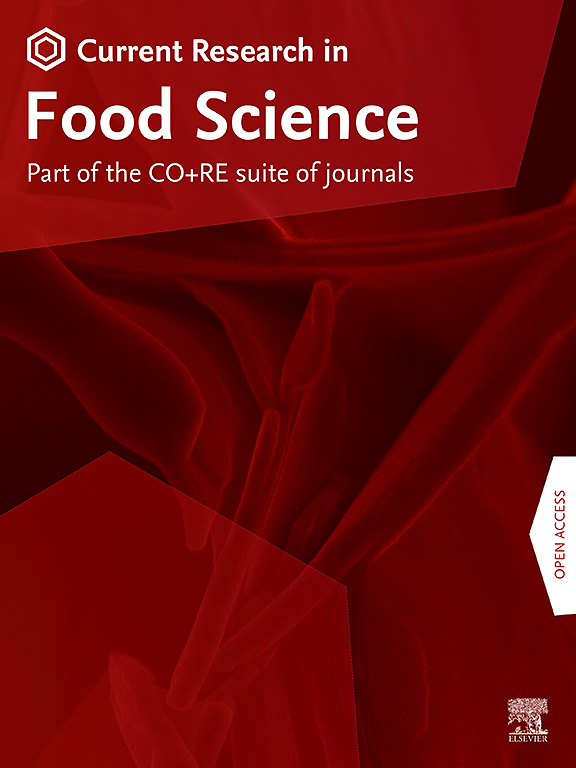通过心灵的透镜品酒:性格和心理健康对葡萄酒感官和精神作用的影响
IF 6.2
2区 农林科学
Q1 FOOD SCIENCE & TECHNOLOGY
引用次数: 0
摘要
葡萄酒不仅是一种广泛消费的饮料,也是一种受个人特征影响的感官和精神体验。本研究旨在探讨人格特质和心理健康状况对有机葡萄酒和传统葡萄酒的味觉感知和精神活性的影响程度。具体来说,我们研究了葡萄酒感知和效果的差异是否可以归因于葡萄酒的生产方法或个人心理特征。共有133名普通葡萄酒消费者参加了一项双盲研究,他们分别在不同的时段饮用有机葡萄酒和传统葡萄酒。他们对每种葡萄酒的味道特征(强度、持续时间和愉悦度)以及兴奋和镇静效果进行了评级。此外,还评估了人格特征(大五人格和黑暗人格)和心理健康状况(快乐、焦虑和抑郁),以探索它们对葡萄酒感知和效果的影响。结果显示,有机葡萄酒和传统葡萄酒在口感强度或愉悦度上没有显著差异,只有口感持续时间上的微弱差异,而传统葡萄酒的味道持续时间略长。然而,在葡萄酒的作用上出现了差异:有机葡萄酒产生了更高的兴奋作用,而传统葡萄酒产生了更强的镇静作用。性格特征和心理健康在形成这些影响方面发挥了关键作用。马基雅维利主义和幸福与两种葡萄酒的刺激增加有关,而自恋只对有机葡萄酒有更高的刺激作用。相比之下,镇静作用与更高程度的自恋和抑郁有关,外向性会减少传统葡萄酒中的镇静反应。这些发现表明,葡萄酒的感知不仅仅取决于其化学成分,还受到个人心理因素的影响。这项研究强调了在理解消费者体验时考虑个性和心理健康的重要性,为葡萄酒行业和酒精相关行为的心理学研究提供了见解。本文章由计算机程序翻译,如有差异,请以英文原文为准。

Tasting through the lens of the mind: The impact of personality and mental health on wine sensory and psychoactive effects
Wine is not only a widely consumed beverage but also a sensory and psychoactive experience influenced by individual characteristics. This study aims to investigate the extent to which personality traits and mental health conditions affect the perception of taste and the psychoactive effects of organic and traditional wine. Specifically, we examine whether differences in wine perception and effects can be attributed to the wine's production method or to individual psychological traits. A total of 133 regular wine consumers participated in a double-blind study, consuming both organic and traditional wine in separate sessions. They rated taste characteristics (intensity, duration, and pleasantness) and the stimulant and sedative effects of each wine. Additionally, personality traits (Big Five and Dark Triad) and mental health conditions (happiness, anxiety, and depression) were assessed to explore their impact on wine perception and effects. Results showed no significant differences in taste intensity or pleasantness between organic and traditional wine, with only a weak difference in taste duration, where traditional wine had a slightly longer-lasting flavor. However, differences emerged in wine effects: organic wine induced a higher stimulant effect, while traditional wine produced stronger sedative effects. Personality traits and mental health played a key role in shaping these effects. Machiavellianism and happiness were associated with increased stimulation for both wine types, while narcissism predicted higher stimulant effects only for organic wine. In contrast, sedative effects were linked to higher levels of narcissism and depression, with extraversion reducing sedative responses in traditional wine. These findings suggest that wine perception is not solely determined by its chemical composition but is shaped by individual psychological factors. This research highlights the importance of considering personality and mental health in understanding consumer experiences, offering insights for both the wine industry and psychological research on alcohol-related behaviors.
求助全文
通过发布文献求助,成功后即可免费获取论文全文。
去求助
来源期刊

Current Research in Food Science
Agricultural and Biological Sciences-Food Science
CiteScore
7.40
自引率
3.20%
发文量
232
审稿时长
84 days
期刊介绍:
Current Research in Food Science is an international peer-reviewed journal dedicated to advancing the breadth of knowledge in the field of food science. It serves as a platform for publishing original research articles and short communications that encompass a wide array of topics, including food chemistry, physics, microbiology, nutrition, nutraceuticals, process and package engineering, materials science, food sustainability, and food security. By covering these diverse areas, the journal aims to provide a comprehensive source of the latest scientific findings and technological advancements that are shaping the future of the food industry. The journal's scope is designed to address the multidisciplinary nature of food science, reflecting its commitment to promoting innovation and ensuring the safety and quality of the food supply.
 求助内容:
求助内容: 应助结果提醒方式:
应助结果提醒方式:


